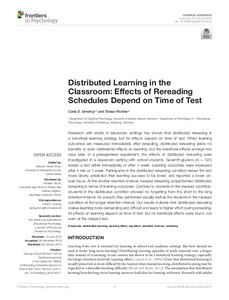Distributed Learning in the Classroom: Effects of Rereading Schedules Depend on Time of Test
| dc.date.accessioned | 2019-02-05T13:12:54Z | |
| dc.date.available | 2019-02-05T13:12:54Z | |
| dc.date.issued | 2019-01-09 | |
| dc.identifier | doi:10.17170/kobra-20190204150 | |
| dc.identifier.uri | http://hdl.handle.net/123456789/11066 | |
| dc.description.sponsorship | Gefördert durch den Publikationsfonds der Universität Kassel | |
| dc.language.iso | eng | |
| dc.rights | Urheberrechtlich geschützt | |
| dc.rights.uri | https://rightsstatements.org/page/InC/1.0/ | |
| dc.subject | distributed learning | eng |
| dc.subject | spacing effect | eng |
| dc.subject | lag effect | eng |
| dc.subject | retention interval | eng |
| dc.subject | rereading | eng |
| dc.subject.ddc | 150 | |
| dc.title | Distributed Learning in the Classroom: Effects of Rereading Schedules Depend on Time of Test | eng |
| dc.type | Aufsatz | |
| dcterms.abstract | Research with adults in laboratory settings has shown that distributed rereading is a beneficial learning strategy but its effects depend on time of test. When learning outcomes are measured immediately after rereading, distributed rereading yields no benefits or even detrimental effects on learning, but the beneficial effects emerge two days later. In a preregistered experiment, the effects of distributed rereading were investigated in a classroom setting with school students. Seventh-graders (N = 191) reread a text either immediately or after 1 week. Learning outcomes were measured after 4 min or 1 week. Participants in the distributed rereading condition reread the text more slowly, predicted their learning success to be lower, and reported a lower on-task focus. At the shorter retention interval, massed rereading outperformed distributed rereading in terms of learning outcomes. Contrary to students in the massed condition, students in the distributed condition showed no forgetting from the short to the long retention interval. As a result, they performed equally well as the students in the massed condition at the longer retention interval. Our results indicate that distributed rereading makes learning more demanding and difficult and leads to higher effort during rereading. Its effects on learning depend on time of test, but no beneficial effects were found, not even at the delayed test. | eng |
| dcterms.accessRights | open access | |
| dcterms.creator | Greving, Carla E. | |
| dcterms.creator | Richter, Tobias | |
| dc.relation.doi | doi:10.3389/fpsyg.2018.02517 | |
| dc.type.version | publishedVersion | |
| dcterms.source.identifier | ISSN 1664-1078 | |
| dcterms.source.journal | Frontiers in Psychology | |
| dcterms.source.pageinfo | 2517 | |
| dcterms.source.volume | 2019, 9 |
Dateien zu dieser Ressource
Das Dokument erscheint in:
-
Artikel [1103]

